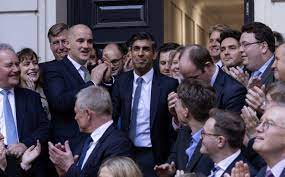David Frost
A vision in a Dream, a Fragment. “We now turn to the BBC’s political editor, Richard Bacon. Richard, tell us about today’s news of an early 2028 general election, and give us your verdict on the Sunak government.” “Well, Gary, of course ever since Mark Steyn won his case against Ofcom, we have been able to say what we really think on the air, so it’s no secret that not many of us here at the BBC thought five years ago that the Conservatives would now be expecting a historic sixth term in government.
“In mid-2023, we were enjoying that long, deep Conservative polling disaster. People like us thought that Rishi Sunak would reliably lead the Tories to election defeat. But suddenly things began to change. He started to become the prime minister his admirers tell us they expected. Famously, he later told the BBC that he had become too conventional; too nervous of taking the tough decisions needed from a leader rather than a manager. “First, that autumn, we got what we all now know as the Second Night of the Long Knives. Firing his chancellor, bringing back people like Simon Clarke and Jacob Rees-Mogg, and what we can all see now was a stroke of genius, making Miriam Cates education secretary, changed the face of the government. But there were changes in policy, too. It seems incredible now, but back then the government was still seriously planning to ban petrol cars and gas boilers. Stopping that showed things were changing. So did making it much harder to get work visas. And remember the great culture wars of the early 2020s? Rishi’s ban on Whitehall diversity spending, and a tax cut with the savings, now seems blindingly obvious. It wasn’t then.
“Things began to look different. The public took a second look. It turned out they weren’t crazy about Keir Starmer – remember him? – but hadn’t been offered any real alternative. Slowly, slowly, the mood began to turn. “But what really changed the game was the promise of a referendum on European human rights law when the Supreme Court blocked the Rwanda policy – and then those famously radical fifth term plans, delaying net zero 2050, reducing visa numbers further, more house-building, a Royal Commission on the NHS, and bringing down spending and taxes by a penny off income tax every year.
“Not all voters liked all these ideas. But many liked at least one of them, and they also liked having a government that actually wanted to fix things. “When the 2024 election came, Labour were still in front, but their lead was falling. Sunak’s expulsion of Tobias Ellwood for persistently urging a return to the EU and for one too many demands for Nato airstrikes on Russia reassured disaffected Tory voters that next time things really would be different. The Reform Party helped by standing only against what it called “socialist Conservatives”. Yes this may have cost the Tories a few seats, but it wiped out the grumpy serial protesters in the parliamentary party. The 25-seat victory confounded Sunak’s critics. “Then we all remember how he seized the moment with his new personal authority – those radical changes to the government machine, putting elected ministers back in charge of their budgets, staff, and appointments.
“All tariffs were abolished. So was most of the bureaucracy holding back British food production. Trade took off. Green subsidies were gradually wound down and modern gas-fired power stations built. Then came the deferral of net zero till 2100. You’ll remember the storm at the time, Gary, but since then other countries have followed, and with energy prices falling and manufacturing investment and jobs booming, no-one wants to go back. “It also turned out we could build houses after all. Local councils had to choose between finding areas to build or having them chosen by the Government instead and forced through by national referendum. They found room to build. Last year’s house building total came in at 400,000. “None of this was plain sailing. Reforming universal credit was deeply unpopular. But it got people back into the workforce as immigration fell. The savings allowed that final cut in income tax to 15 per cent in last month’s Budget. Tax relief on private health care has eliminated the horrendous waiting lists of 2023 by expanding hospital capacity. Wages in the health service have gone up as hospitals compete for staff for the first time. The planned transition to a European-style health service is starting.
“The Sunak style has been to get a grip, explain his agenda clearly to voters, and get ahead of events. Polling shows most voters think the country is firmly on the up. EU membership has become fringe politics because Sunak has shown that Britain is perfectly capable of governing itself and succeeding. And voters still see that change of heart in autumn 2023 as the moment things shifted.” A knock came on the door. I jerked awake. Must be that delivery from Porlock. Reaching instinctively for my phone, I saw, over my familiar lock screen photo of Mount Abora, the news alert: the government had just agreed to pay £2 billion a year to rejoin the EU’s Horizon programme. Back to reality.







